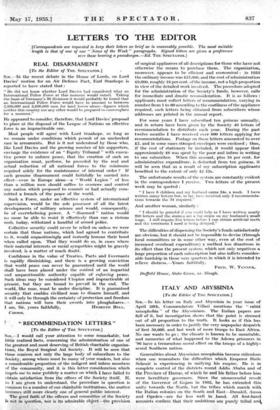" RECOMMENDATION LETTERS "
[To the Editor of THE SPECTATOR.] S1R,—I would call your attention to some remarkable, but little realized facts, concerning the administration of one of the greatest and most deserving of British charitable organiza- tions, the Royal Surgical Aid Society. It will be seen that these concern not only the large body of subscribers to the Society, among whom must be many of your readers, but also a considerable proportion of the indigent and infirm members of the community, and it is this latter consideration which impels me to raise publicly a matter on which I have failed to obtain satisfaction from the offices of the Society itself. If, as I am given to understand, the procedure in question is common to a number of our charitable institutions, the matter becomes still more clearly one of general public interest.
The good faith of the officers and committee of the Society is not in question, nor is its admirable object—the provision of surgical appliances of all descriptions for those who have not otherwise the means to purchase them., The organization, moreover, appears to be efficient and economical : in 1933 the ordinary income was £55,000, and the cost of administration £9,000, roughly 16 percent. of the income, not a high proportion in view of the detailed work involved. The procedure adopted for the administration of the Society's funds, however, calls for immediate and drastic reconsideration. It is as follows : applicants must collect letters of recommendation, varying in number from 1 to 60 according to the costliness of the appliance required, such letters being obtained from subscribers whose addresses are printed in the annual report.
For some years I have subscribed ten guineas annually, and in return have been given by the Society 40 letters of recommendation to distribute each year. During the past twelve months I have received over 800 letters applying for recommendations. Postage on these letters amounted to over £5, and in some cases stumped envelopes were enclosed ; thus, if the cost of stationery be included, it would appear that approximately £8 was spent by the poor and infirm in writing to one subscriber. When this amount, plus 16 per cent. for administrative expenditure, is deducted from ten guineas, it will be seen that as a result of my subscription applicants benefited to the extent of only £2 15s.
The unfortunate results of the system are constantly evident in the correspondence I receive. Two letters of the present week may be quoted :
" I have 6 children and my husband earns 34s. a week. I have written many letters but, se far, have received only 3 recommenda- tions towards the 24 required."
And .another woman, similarly : " I should be grateful if you could help as I have written nearly 200- letters and the stamps are a big strain on my husband's small wage. I still require five letters before I can obtain artificial teeth and the treatment I need is being delayed."
The difficulties of dispensing the Society's funds satisfactorily are obvious, but it should not be impossible to devise (through local committees or in some other way, even at the cost of increased overhead expenditure) a method less disastrous in
its effect than the present system, which not only negatives a large proportion of each subscription but also inflicts consider- able hardship in those very quarters in which it is intended to relieve distress.—Yours faithfully,
FRED. W. TANNER.
Duffield House, Stoke Green, nr. Slough.










































 Previous page
Previous page